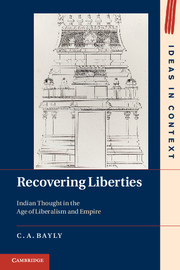Book contents
- Frontmatter
- Contents
- Preface
- Note on Indian names
- Introduction
- Chapter 1 The social and intellectual contexts of early Indian liberalism, c.1780–1840
- Chapter 2 The advent of liberalism in India
- Chapter 3 The advent of liberal thought in India and beyond
- Chapter 4 After Rammohan
- Chapter 5 Living as liberals
- Chapter 6 Thinking as liberals
- Chapter 7 Giants with feet of clay
- Chapter 8 Liberals in the Desh
- Chapter 9 ‘Communitarianism’
- Chapter 10 Inter-war
- Chapter 11 Anti-liberalism, ‘counter-liberalism’ and liberalism’s survival, 1920–1950
- Conclusion
- Glossary
- Select bibliography
- Index
- References
Chapter 3 - The advent of liberal thought in India and beyond
civil society and the press
Published online by Cambridge University Press: 05 June 2012
- Frontmatter
- Contents
- Preface
- Note on Indian names
- Introduction
- Chapter 1 The social and intellectual contexts of early Indian liberalism, c.1780–1840
- Chapter 2 The advent of liberalism in India
- Chapter 3 The advent of liberal thought in India and beyond
- Chapter 4 After Rammohan
- Chapter 5 Living as liberals
- Chapter 6 Thinking as liberals
- Chapter 7 Giants with feet of clay
- Chapter 8 Liberals in the Desh
- Chapter 9 ‘Communitarianism’
- Chapter 10 Inter-war
- Chapter 11 Anti-liberalism, ‘counter-liberalism’ and liberalism’s survival, 1920–1950
- Conclusion
- Glossary
- Select bibliography
- Index
- References
Summary
The third and fourth transnational contexts for the emergence of Indian liberalism, besides the idea of the constitution and the jury, were the issues of press freedom and the security of property. To general arguments in favour of freedom of communication Indian writers brought very specific grievances which derived from a sense that an open system of plaint and petition prevalent in pre-colonial India had been closed down and rendered secretive and unaccountable by the Company, both by restrictions on judicial openness and through press censorship. Here Mughal exemplars of free access to authority were invoked to root ideas which were appropriated from European and American debates.
Ideologies of a free press
Free communication was an essential foundation of the Western liberal theory of civil society, as important as free trade and, like free trade, regarded as a moral as well as an economic imperative. Adam Ferguson, in particular, argued that ‘communication’ and debate were vital for the health of national collectivities and human liberty. Jeremy Bentham, as ever, rationalised the liberals’ ideology of free communication into a legislative principle. Non-readers were one of the few categories of people that he initially wanted to be excluded from the general franchise. A free press could rapidly work miracles, however. Writing on the affairs of Tripoli, Bentham contended that the foundation of newspapers would rapidly dissolve Muslim ‘despotism’ and create a ‘tribunal of public opinion’.
- Type
- Chapter
- Information
- Recovering LibertiesIndian Thought in the Age of Liberalism and Empire, pp. 73 - 103Publisher: Cambridge University PressPrint publication year: 2011

